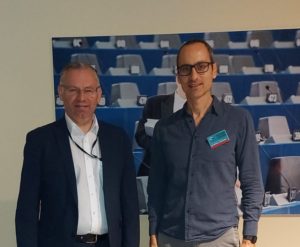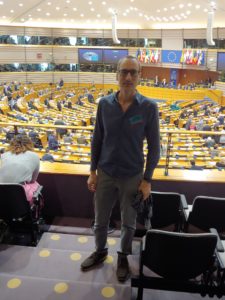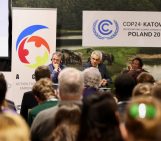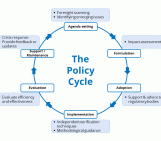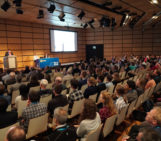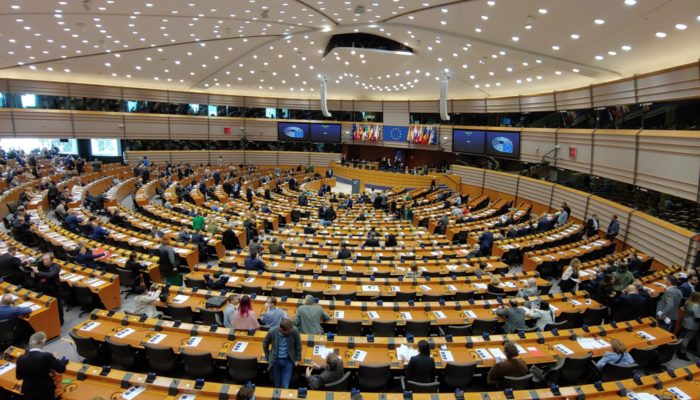
The EGU’s annual Science-Policy Pairing Scheme connects a selected EGU member with a Member of the European Parliament to promote evidence-informed policymaking and encourage stronger science-policy partnerships! In November 2022, EGU Member of Manchester Metropolitan University Elias Symeonakis was paired with the selected Member of the European Parliament, Norbert Lins, an MEP representing Germany and the Group of the European People’s Party. In this month’s GeoPolicy Blog post, Symeonakis shares his experiences with the Pairing Scheme along with his key take-home messages.
In November 2022, I was selected to participate in the EGU’s Science-Policy Pairing Scheme. I was absolutely thrilled when I received the news from the EGU Policy Manager, Chloe Hill: for a few years now, I have been considering getting involved in the science-policy interface but hadn’t really been able to come this close to the real action! Thanks to this excellent scheme, which I hope will receive the support it deserves from the EGU community, I was able to spend practically a full week inside the European Parliament in Brussels, meeting with policymakers and participating in numerous committee meetings and other sessions.
The selected Member of the European Parliament (MEP), Norbert Lins and his assistant, Sebastian Jehle, were excellent hosts! From day one, my schedule was organised by my hosts so that I could participate in as many sessions of the AGRI and ENVI committees as possible. These included, amongst others:
- A hearing in relation to the celebration of the 60 years of the Common Agricultural Policy
- A hearing of authors of the Study by the Community Plant Variety Office on the “Impact of the Community Plant Variety Rights system on the EU economy and the environment”
- A number of meetings with the European Parliament’s Committee on Environment, Public Health and Food Safety
- A meeting with an MEP from the European Parliament’s Committee on Environment, Public Health and Food Safety
MEPs as flexible negotiators
On Tuesday, I had a lengthy meeting and an interesting discussion with Mr Lins in his office, which I appreciate a lot, given his very busy schedule. Our discussions were mostly related with the new Common Agricultural Policy – which he helped negotiate – the continuing use of fertilisers, the eating habits of Europeans, the new generation of breeding techniques in crops, as well as the busy schedules of MEPs and their commitments that keep their schedules full even on weekends when they go back to their constituents. While we didn’t agree on all of the issues, I really appreciated his willingness to discuss the topics in such an open manner. This flexibility and readiness to negotiate with different sectors and stakeholders was one of the aspects that struck me most throughout the week as it isn’t something that scientists generally have to contend with. Something that I took away from this, was the need for scientists to not only provide accurate and relevant information to policymakers, but to also contextualise it and ensure that the benefits of certain policy options and how they relate to different stakeholders are understood. By thinking about the demands that policymakers are trying to meet and finding synergies, scientists may be able to help them see how and where the information provided can be used in the policymaking process.
The early bird catches the worm
I could have missed one of the key moments during the week had I succumbed to the need for a bit of extra sleep and refused the kind invitation by my host to participate in an informal breakfast session with representatives from the European Commission, MEPs from several parties, and stakeholders from the agricultural sector. Informal breakfast meetings are a common occurrence inside the Parliament and provide a space for external stakeholders to discuss issues that are relevant to MEPs sitting on specific Committees. During one such breakfast meeting, we sat around a large round table to listen to the representative of the Commission present the state-of-affairs on the new generation of breeding techniques of seeds.
During the discussion, the Commission made it very clear that it was considering all scientific evidence and not fazed by calls for pragmatism or the time pressures raised by both the MEPs and the invitees from the agricultural sector. Although it was tempting to contribute to this discussion, I felt that there were too many people that wanted to talk with very little time available. However, as soon as the meeting was officially over, a fellow scientist – this time from the pharmaceutical industry-, managed to target some of the key policymakers in attendance and have a lengthy private discussion, highlighting some of the key perspectives from their side. This experience underscored the importance of these informal networking opportunities as well as the smaller discussions that happen around the coffee pot afterwards. Unless scientists are in the room, our expertise and key resources will not be considered.
Scientists need to start engaging more with political processes to ensure evidence is considered
With science being my profession and politics my passion, the bridging of the two could only spark joy, I always thought. However, while there were plenty of joyful, exciting moments during my visit of the European Parliament and my participation in meetings and discussions, there were also several moments when I felt conflicted. In most of the above mentioned meetings, and those that are not listed here, I felt that there wasn’t enough discussion on the scientific evidence. Instead, emotions and values played a bigger role in the decision-making process than I expected. The truth is, I left Brussels feeling that the scientific world is not nearly as involved as it should be with decision-making. A reality that I believe needs to change with persistent, continuous efforts from both the scientific and policy families, alike. The EGU’s Science-Policy Pairing Scheme is a good step towards greater collaboration but we shouldn’t stop there. We owe it to the constituents; we owe it to the Planet!
Recommendations for future Pairing Scheme applicants and other scientists who’d like to engage with policy
- Do engage! Policy directly affects the global climate, billions of people, future generations, flora and fauna, you name it! Scientists need to be in the room to support the decision-making process.
- Be informed! There are numerous EU Policies in place that one simply has to be informed about before engaging with MEPs, such as the CAP, the Green Deal, Fit for 55, and many many others.
- Don’t miss those early morning informal breakfast opportunities: they can provide an eye-opening experience and the chance to talk to stakeholders and policymakers from all sides and institutions!
Thanks to Elias Symeonakis for his participation in the 2022 Science-Policy Pairing Scheme and for sharing his experiences inside the European Parliament!

